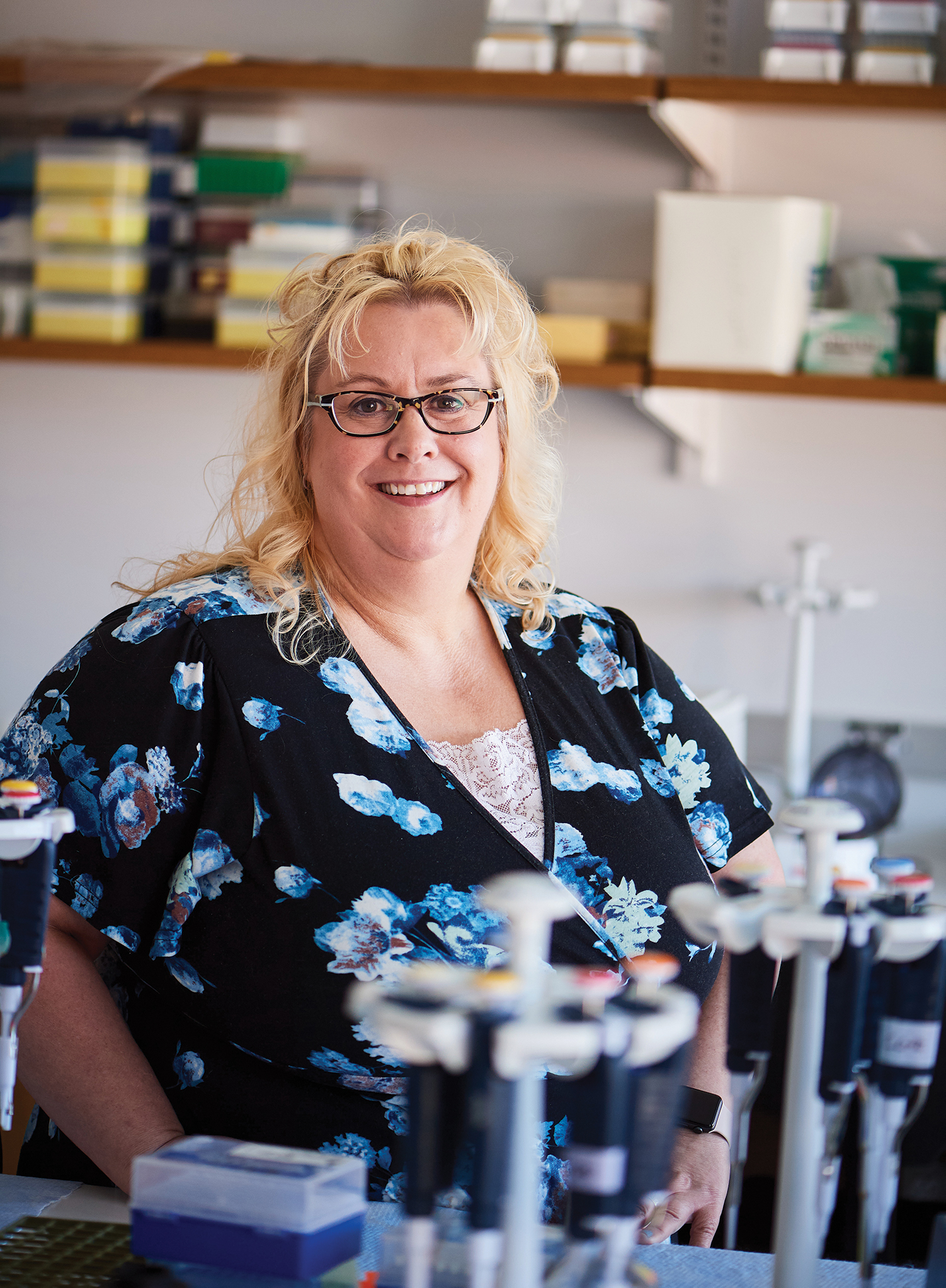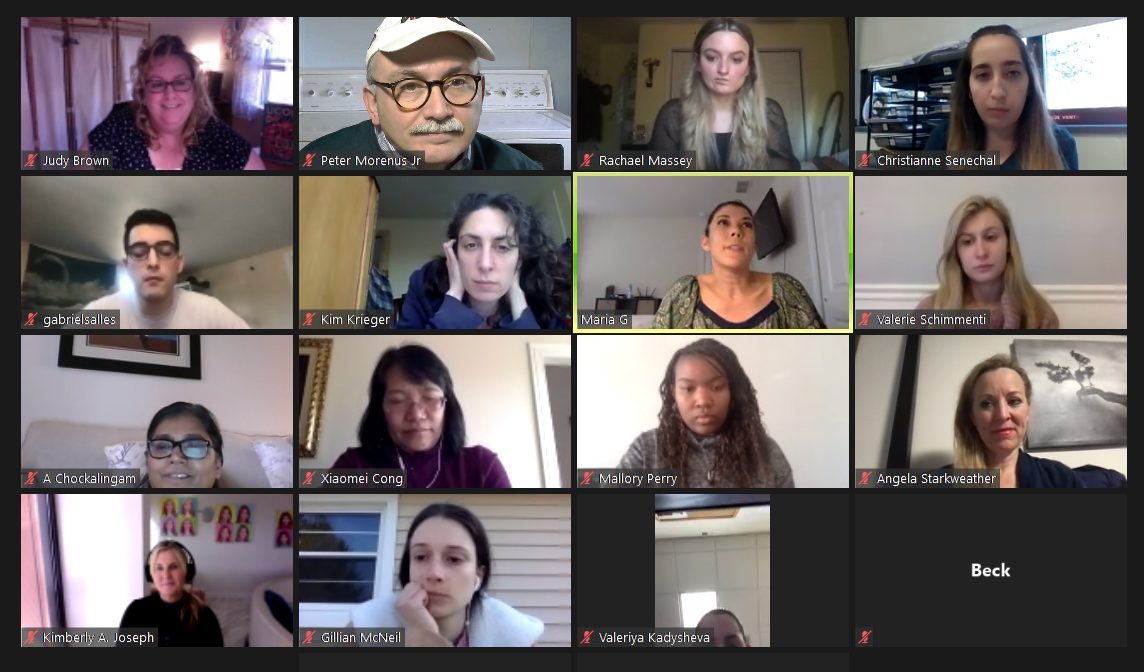ISG 5095: Diversity and Inclusion in Genetics

An associate professor in the School of Nursing, Judy Brown '98 MS, '07 Ph.D., also is a director in UConn's Institute for Systems Genomics.
The Instructor:
Opera divas have nothing on Judy Brown '98 MS, '07 Ph.D. When she stands to talk, all eyes are upon her. She speaks with such passion for her subject and empathy for her listener, and so compellingly does she make her points, that anyone who hears her may suddenly find themselves fascinated by the ethical implications of an extra chromosome or variant gene.
That's Judy Brown the instructor, Judy Brown the panel guest, Judy Brown the project director. But there's another side of Brown, too. Her expertise and passion come with a self-effacing humility and quiet thoughtfulness that make her all the more effective as an instructor.
"I don't think of myself as a teacher, rather as a learner alongside others, a facilitator of showing others how to learn and where to find information," Brown says. "I dislike the term 'lecture' as it reminds me of being a child and being reprimanded by a parent."
Brown's parents were quite surprised when she decided to go for an undergraduate degree in science — they were under the impression she was going to be a novelist. But somehow the science bug bit. After trying out veterinary work (allergies nixed that), dentistry (she fainted at the first sight of blood), pharmacy (counting and sales contraindicated with her interests), she finally got a job in a cytology lab and found she was into it. Lab maintenance and the glass shards that stuck into her fingers did not deter her.
Shortly after college, Brown scored a job in the cytogenetics lab at the SUNY Upstate Medical Center (now University), and she found she had a thing for chromosomes. She accepted a teaching position in the Diagnostic Genetic Sciences (DGS) program in UConn's School of Allied Health while pursuing her Ph.D., and ended up becoming the program director. She has created two graduate degrees at UConn (Health Care Genetics and the Genetic and Genomic Counseling Professional Science Masters), co-founded the UConn Chromosome Core, and most recently joined the School of Nursing in fall 2020.
"The School of Nursing has an innovative, quick response to education — it's been a delight," Brown says.
In response to the current social climate, Brown, a faculty member of the Institute for System Genomics, decided to offer a special-topics class this year — ISG 5095: Diversity and Inclusion in Genetics.
Class Description:
Genetics — especially our own, and the secrets we can learn with it about our ancestors' past and our medical future — have captivated the nation since 23andMe became the first company to offer popular DNA testing for ancestry purposes in 2007. The availability of medical genetic testing has also surged. But neither the people who donate the genetic material most of our clinicians rely on, nor the genetic counselors themselves, are very diverse. That lack of diversity limits the usefulness of the information, Brown says.
"If there's no such thing as race, but people of certain backgrounds are predisposed to certain conditions —why?" she asks. Genetics counselors need to understand the nuances around perceived race, risk, and predisposition. And if genetics counselors all come from the same background, being taught by and with people who are the same as themselves, they can lack necessary perspective. They can also turn off clients who might benefit from testing but need a counselor who shares their background in order to feel comfortable.
"We need not necessarily implement a new policy or a new political view, but we need to address diversity," Brown says.

Brown's classes are open to all. Attendees change on any given day, but often include doctors, nurses, and program directors from UConn Health and the Jackson Laboratory, as well as professors and students from across the University.
Brown's Teaching Style:
Brown says she hasn't "taught" a class in 20 years. She prefers to assign readings and research to be done before the class so the students can discuss it during class time.
"Class is so much about in-person interactions, discussions, and 'Judge Judy' debates," Brown says. All of that has been harder this year using the remote pandemic learning model, but she's adapted. The diversity topic demanded that she schedule guest speakers, and she's turned to her colleagues in nursing and genomics.
At a recent class, a question posed to guest speaker Mallory Perry, an acute pediatric nurse practitioner at the Children's Hospital of Philadelphia, quickly pivoted to mainstream media's recent move toward capitalizing "Black" when referring to people's ethnicity. Perry explained she prefers "Black" to "African American" because she has no idea where her lineage actually comes from; what matters is how she is perceived. How we — and others — perceive ourselves, and what our genetic variants suggest about our background and our health, can be very divergent things. Genetics counselors need to navigate this with tact.
Another class activity involves research questions designed to lead the students on hunts to navigate genetic databases relevant to specific groups of people. And this year in particular, Brown is leading writing exercises to help the students develop their own diversity statements.
Why We Want to Take It Ourselves:
The word "diversity" is being thrown around a lot these days. In Brown's class, students take a deep dive into what diversity really means. And they delve into how every one of us, no matter our race, can further the cause of inclusion. One way any student or professor can do that is to work on their own institutions. So this year Brown's students are interviewing people on campus, as well as members of UConn's Institute for Systems Genomics, in order to make a formal proposal for diversity and inclusion policies for the Institute itself.
"A Native American student, Yellow Bird Woman, made me more aware of the lack of diversity in genomics professionals," Brown says. And she decided to do something about it. When you want to learn something, it's always best to learn from someone who practices what they preach.
By kim krieger
Photos by Peter Morenus

Leave a Reply